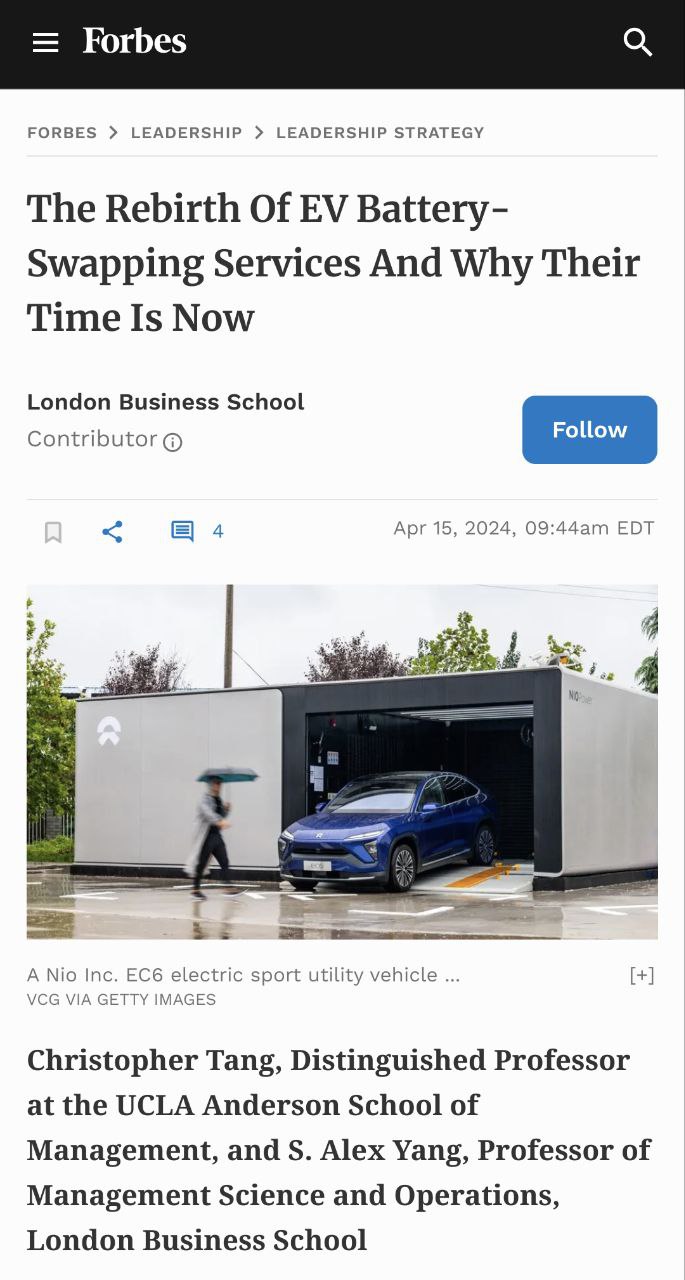The Rebirth Of EV Battery-Swapping Services And Why Their Time Is Now (Forbes)
TL;DR
- EV Battery Swap: Emerging as a critical part of the EV ecosystem.
- Current Relevance: Addresses EV charging challenges and supports urban adoption.
- Cost Efficiency: Lowers initial EV adoption costs by leasing battery packs.
- Extended Battery Life: Optimized charging conditions extend battery lifespan.
- Grid Support: Acts as virtual power plants, stabilizing energy grids.
- Logistics & MaaS: Essential for efficient and clean transportation solutions.
- Market Momentum: Strong interest from governments, fleet operators, and major stakeholders.

In a recent Forbes article titled “The Rebirth Of EV Battery-Swapping Services And Why Their Time Is Now,” published on April 15, 2024, by London Business School Contributor, the resurgence of EV battery-swapping technology is explored. The article outlines why this technology is gaining traction and highlights key advantages.
Key Advantages of EV Battery Swap
1. Cost-Effective Adoption: Battery-swapping allows users to lease batteries, significantly reducing the initial cost of EV ownership. Forbes notes, “Battery-swapping also lowers customers’ initial cost of adopting an EV by allowing them to purchase only the vehicle body and lease the battery pack.”
2. Enhanced Battery Lifespan: By charging at optimal conditions, battery-swapping stations extend battery life and reduce electronic waste. “Batteries in a swapping system can be charged at a slower pace, which can extend the lifespan of EV batteries and consequently reduce electronic waste,” as highlighted by Forbes.
3. Grid Support and Energy Management: Charging during off-peak hours, battery-swapping stations can stabilize the energy grid and act as virtual power plants, reducing peak demand. Forbes emphasizes that these stations can “function as ‘virtual power plants,’ sending energy back to the local grid during these periods.”
Industry Adoption
The resurgence of battery swapping is supported by its growing adoption in logistics and Mobility as a Service (MaaS). Various stakeholders, including governments and major EV manufacturers, are investing in this technology.
Our Takeaway
From Tin Hang Liu, the Founder & CEO of Open Energy: “We are having conversations with some of the biggest stakeholders in energy, EV manufacturing, governments, and fleet operators. All of them show strong interest in EV battery swap technology. In today’s on-demand world, where services like Uber, Amazon, and food delivery are booming, the need for efficient, clean transportation is clear. Governments push for a transition from ICE to EV, making EV battery swapping a logical and inevitable step.”
Conclusion
EV battery swapping is no longer a futuristic concept but a present-day reality. Its time is now, offering strategic advantages for logistics, MaaS, and the broader EV market. This technology is set to play a pivotal role in driving sustainable transportation forward.